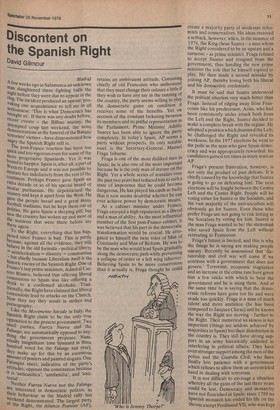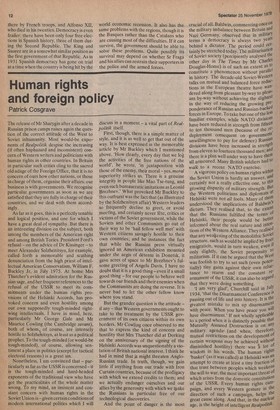Discontent on the Spanish Right
David Gilmour
Madrid A few weeks ago in Salamanca an unknown man slaughtered three fighting bulls the night before they were due to appear in the ring. The incident produced an uproar, provoking one acquaintance to tell me in all Seriousness: 'This is what Democracy has brought us'. If there was any doubt before, recent events — the Bilbao mutiny, the attempted coup last weekend, the noisy demonstrations at the funeral of the Basque terrorists victims— have demonstrated how angry the Spanish Right still is. The post-Franco reaction has been too quick and too vigorous even for some of the ,More progressive Spaniards. Yet it was ...bound to happen. Spain is, after all, a part of Westeni Europe and it was not possible to insulate her indefinitely from the rest of the continent. Perhaps Franco gave Spain an extra decade or so of his special brand of insular puritanism. He depoliticised the country and kept it apart from the West. He gave the people bread and a great many football stadiums, but he kept them out of Politics. He gave Spain a sleeping pill, but now the country has woken up and most of the tensions that were there before are there again. To the Right, everything that has hap Eened since Franco is bad. This is partly ,uecause, against all the evidence, they still believe in the old formula —political liberty anticlericalism = disunity = communism — but chiefly because Liberalism itself is the historic enemy of the Spanish Right. One of Franco's last prime ministers, Admiral Carrero Blanco, believed that offering liberal concessions to Spain was like offering a drink to a confirmed alcoholic. Traditionally, the Right have claimed that liberal concessions lead to attacks on the Church. Now they say they result in strikes and Pnrnography. Like the Movimento Sociale in Italy, the SPanish Right claim to be the only true bPPosition to the present government. Two small parties, Fuerza Nueva and the P,,filange, are automatically opposed to anywing the government proposes. Numerically insignificant (one Spaniard in three hundred voted for the Falange last year), they make up for this by an enormous ,amount of posters and painted slogans. One valangist sheet, indicative of the party's attitudes, opposes the constitution because it is 'anticatolica', `antifamilia', and 'antisocial'.
Neither Fuerza Nueva nor the Falange are interested in democratic politics, as their behaviour at the Madrid rally last Weekend demonstrated. The largest party Of the Right, the Alianza Popular (AP), retains an ambivalent attitude. Consisting chiefly of old Francoists who understand that they must change their colours a little if they wish to have any say in the running of the country, the party seems willing to play the democratic game on condition it receives some of the benefits. Yet on account of the constant bickering between its members and its pitiful representation in the Parliament, Prime Minister Adolfo Suarez has been able to ignore the party completely. In today's Spain, AP seems a party without prospects. Its only notable asset is the Secretary-General, Manuel Fraga Iribarne. Fraga is one of the most disliked men in Spain; he is also one of the most important because he is the only man of stature on the Right. Yet a whole series of mistakes over the past two years had reduced him to such a state of impotence that he could become dangerous. He has played his cards so badly that it now seems doubtful whether he can ever achieve power by democratic means. As a • cabinet minister under Franco, Fraga enjoyed a high reputation as a liberal and a man of ability. As the most influential member of the first post-Franco cabinet, it was believed that his part in the democratic transformation would be crucial. He arrogated to himself the twin roles of Man of Continuity and Man of Reform. He was to be the man who would lead Spain gradually along the democratic path while preventing a collapse of order or a left wing takeover. Believing Spain to be more conservative than it actually is, Fraga thought he could create a majority party of moderate reformists and conservatives. His ideas received a setback, however, when, in the summer of 1976, the King chose Suarez — a man whom the Right considered to be an upstart and a turncoat — as prime minister. Fraga refused to accept Suarez and resigned from the government, thus handing the new prime minister the role that he himself aspired to play. He then made a second mistake by joining AP, thereby losing both his liberal and his democratic credentials.
It must be said that Suarez understood the political situation very much better than Fraga. Instead of edging away from Francoism like his predecessor, Arias, who had been consistently under attack both from the Left and the Right, Suarez decided to make a complete break with the regime. He adopted a position which disarmed the Left; he challenged the Right and revealed its weakness. In the 1977 elections he went to the polls as the man who gave Spain democracy and was appropriately rewarded: his candidates gained ten times as many seats as AP.
Fraga's present frustration, however, is not only the product of past defeats. It is chiefly caused by the knowledge that Suarez is going to go on defeating him. The next elections will be fought between the Centre Left and the Centre Right. People will be voting either for Suarez or the Socialists, and the vast majority of the anti-socialists will obviously go for Suarez. Even those who prefer Fraga are not going to risk letting in the Socialists by voting for him. Suarez is the man Fraga wanted to be: the statesman who saved Spain from the Left without retreating to Francoism.
Fraga's future is limited, and this is why the things he is saying are making people uneasy. Recently he announced that 'dictatorship and civil war will come if we continue with a government that does not govern.' Terrorism, economic stagnation and an increase in the crime rate have given him a few sticks with which to beat the government and he is using them. And at the same time he is saying that the demo cratic reforms have gone too far and were made too quickly. Fraga is a man of much talent and more ambition (he has been compared to Jacques Chirac) and he knows the way the Right are moving — further to the Right. Their numerical weakness is not important (things are seldom achieved by majorities in Spain) but their distribution in the country is. They still have strong sup port in an army historically addicted to interfering in political affairs. They have even stronger support among the men of the police and the Guardia Civil, who have finally lost patience with a government which refuses to allow them an unrestricted hand in dealing with terrorism. It is not difficult to envisage a situation whereby all the gains of the last three years could be lost. Democracy and monarchy have not flourished in Spain: since 1789 no Spanish monarch has ended his life on the throne except Ferdinand VII, who was kept there by French troops, and Alfonso XII, who died in his twenties. Democracy is even frailer: there have been only four free elections in Spanish history, three of them during the Second Republic. The King and Suarez are in a somewhat similar position as the first government of that Republic. As in 1931 Spanish democracy has gone on trial at a time when the country is being hit by the world economic recession. It also has the same problems with the regions, though it is the Basques rather than the Catalans who are causing most of the difficulties. If it can survive, the government should be able to solve these problems. Quite possibly its survival may depend on whether Sr Fraga and his allies can restrain their supporters in the police and the armed forces.



































 Previous page
Previous page